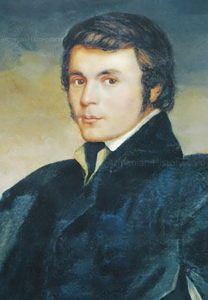A pioneering figure who significantly influenced the trajectory of Armenian literature and intellectual thought, Khachatur Abovian, often heralded as the “father of modern Armenian literature,” was a visionary who believed in the power of enlightenment and the potential of his nation.
Early Life and Education
Born on October 15, 1809, in the scenic village of Kanaker, now part of Yerevan, Armenia, Abovian grew up against a backdrop of political turmoil and cultural fusion. His education at the Nersisian School in Tiflis (modern Tbilisi, Georgia) exposed him to Eastern Armenian literature, Russian language and literature, and European Enlightenment philosophy. This cross-cultural academic experience served as a formative influence on his writing and worldview.
A Revolutionary Literary Career and Contributions
Defying conventions, Abovian chose to write in the Eastern Armenian vernacular, an innovative decision that opened the doors of literature to the broader Armenian public. His novel “Wounds of Armenia” (“Verk Hayastani” in Armenian), written in 1841, is regarded as the first modern Eastern Armenian novel. This groundbreaking work portrays the turbulent times during the Russo-Persian War of 1826-28 and showcases the resilience of the Armenian people.
Abovian didn’t limit himself to prose. His collection also includes a wealth of poems, songs, and fables, reflecting his deep love for his homeland, his unwavering belief in enlightenment, and his desire for societal advancement.

A Beacon of Progressive Ideas and Intellectual Leadership
Abovian was more than just an author. He was a torchbearer of progressive ideas, advocating education as a key to societal progress. He held a firm belief in the potential of an enlightened society and encouraged Armenians to embrace their cultural identity and language, a theme often echoed in his works.
A Mysterious Disappearance and An Enduring Legacy
Abovian’s life took a mysterious turn when he disappeared without a trace on the morning of April 2, 1848. Despite extensive searches and investigations, his fate remains an unsolved mystery to this day. Yet, the enigma of his disappearance has in no way dimmed the luminescence of his literary and intellectual contributions.

Today, Abovian’s life and works are commemorated in various ways. His portrait adorns the Armenian 1000 dram banknote, a street in Yerevan bears his name, and his house in Yerevan is now a museum that honors his memory and legacy. His works are not just pieces of historical literature; they continue to inspire, educate, and evoke a sense of national pride among Armenians.
Through his literary prowess and progressive vision, Khachatur Abovian (Abovyan) left an indelible mark on Armenian literature and society. He championed the cause of enlightenment, democratized literature through his choice of language, and instilled a sense of cultural pride among Armenians. His legacy serves as a beacon, guiding us to appreciate our cultural heritage and continuously strive for enlightenment and progress.
Stay Updated with Us
For more interesting stories and updates about Armenian history and culture, make sure to follow our Facebook page. We regularly share unique content that helps you delve deeper into Armenia’s rich and fascinating past. Let’s keep the conversation going, see you there!
